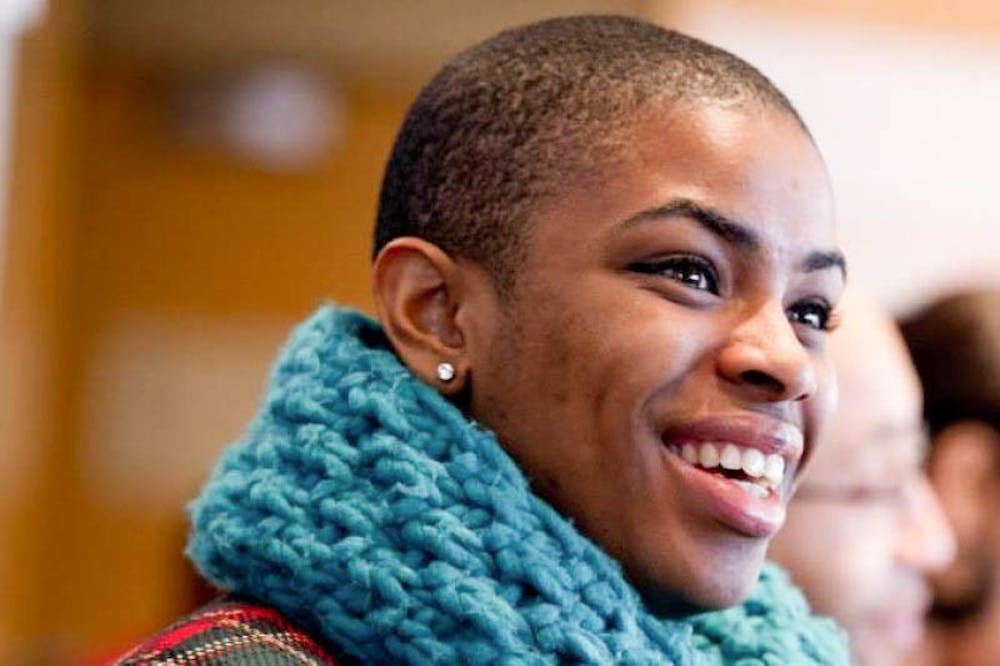This fall, the LGBTQ Center welcomed its newest staff member, Program Coordinator Je-Shawna Wholley.
Wholley describes herself as “unapologetically” black, queer and a feminist. She felt Brown would allow her to draw on those identities in the course of her work. “Being a first-generation college student from a relatively low-income background, finding a job has been about survival,” she said. “However, I grew to value myself and the work that I do and realized that I deserved to work for an institution that would value me. I got the impression that I would be valued here at Brown.”
The creation of Wholley’s new position comes as a result of the Diversity and Inclusion Action Plan, said Kelly Garrett, director of the LGBTQ Center. Wholley’s primary responsibilities will include supervising undergraduate and graduate student staff at the LGBTQ Center and coordinating the center’s support resources. In the long term, Wholley will likely contribute to the center’s gender and sexuality sensitivity training for faculty, staff and student groups, Garrett said.
“We could see that Je-Shawna would connect well with students,” Garrett said. “She has an amazing ability to bridge academia and theory with the practical.”
The position is Wholley’s first job out of graduate school — she graduated from Minnesota State University at Mankato in May with a master’s degree in gender and women’s studies. Her studies focused on intersectionality.
Wholley has always been involved in community activism, said Shannon Miller, chair of Mankato’s gender and women’s studies department. While conducting research for her degree, Wholley participated actively in program development at Mankato. Miller said she expects Wholley will “not only be active on campus,” but also keep the national LGBTQ community in her mind as she adjusts to Brown, she said.
“She’s probably already started doing amazing things (at Brown) and will really unite (Brown’s) campus and get people talking that have not spoken to each other before,” Miller said.
Before graduate school, Wholley worked for the National Black Justice Coalition, a civil rights organization that advocates on behalf of black LGBTQ people. She traveled around the country connecting with black LGBTQ college students. “My job was to make sure that they were informed and were informing our policy advocacy,” Wholley said, adding that the experience of ensuring that a national nonprofit remained grounded in grassroots activism would be particularly useful in her new job.
“Brown students have a reputation for being politically active,” she said. “I’m able to navigate that realm in a way that honors their right to speak while helping them remain productive so that they can accomplish their goals.”
Occasionally, working to advance LGBTQ rights at a national level made her feel like she was spread too thin, she said. “I want to spend time in the community and build relationships with the students” at Brown.
Wholley’s own journey as a queer activist began as an undergraduate at Spelman College, where she reluctantly agreed to be president of the school’s LGBTQ student group, Afrekete. Wholley struggled with feelings of inadequacy and inexperience as a representative of Afrekete.
“I didn’t feel that I could speak for the community. I didn’t experience violence or abandonment from my family as a result of being queer — my mother never let her journey of acceptance interfere with being my mom,” she said.
Wholley only began to embrace her role as president of the group once she understood that she could use the position to amplify the stories and concerns of people in her community.
Wholley’s experience leading Afrekete also made her a staunch believer in the power of politicized programming.
In a push back against Morehouse College’s “appropriate attire” policy, Afrekete created a drag fashion show on Spelman’s campus to provide queer people from Spelman and beyond with the opportunity to come together and express their identities. “This was our way of saying that not only are we not going to be silent about this, we’re also going to take up space,” she said.
Wholley added that she would like to bring similar programming to campus if students expressed interest.
“Storytelling is a method of activism. That’s how I see my work as a leader,” she said.





